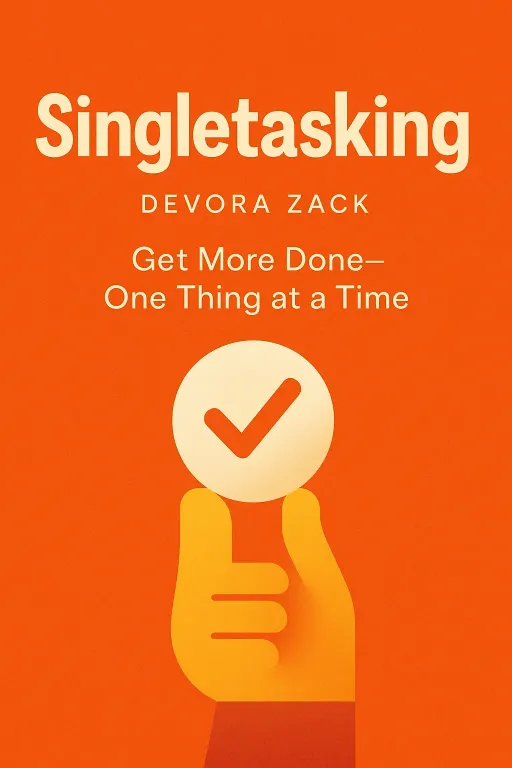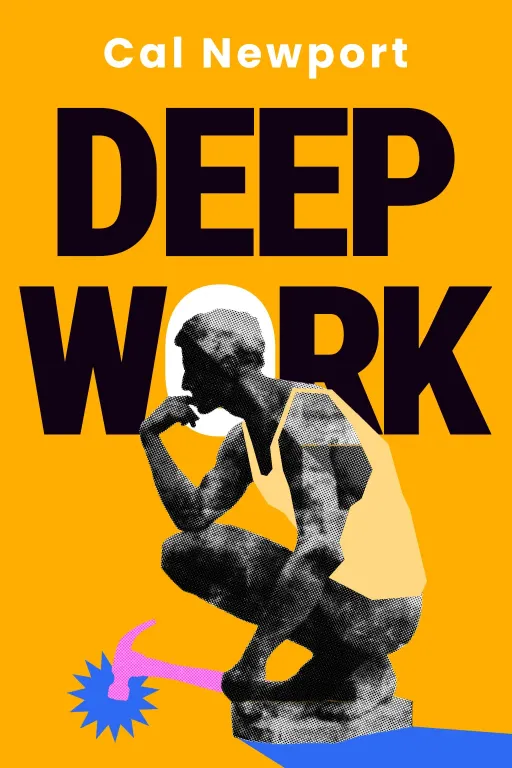
The 500-Switch Day
11 minGet More Done—One Thing at a Time
Golden Hook & Introduction
SECTION
Mark: A Harvard study found the most productive employees switch focus only a few times a day. The least productive? Up to 500 times. Michelle: Hold on. Five hundred? As in, five-zero-zero? That can't be right. That’s more than once a minute for an entire workday. Mark: That's not a typo. 500 times. It turns out the secret to getting more done isn't being a great multitasker—it's being a master at avoiding it. Michelle: Wow. That completely flips the script on everything we're taught about being productive. Mark: It absolutely does. And that's the core idea behind the book we’re diving into today, Singletasking: Get More Done—One Thing at a Time by Devora Zack. Michelle: Devora Zack. I like the directness of that title. Mark: And what's fascinating about Zack is that she's an avowed introvert who built her career helping people succeed without faking extroverted habits. So this book isn't about hustle culture or becoming some kind of productivity machine. It’s about working with your brain's natural design, not against it. It’s received really positive reviews for being practical and science-backed. Michelle: Okay, I’m intrigued. Because my brain feels like it's constantly in a state of war with my to-do list. But wait, isn't multitasking just something we have to do in the modern world? How is it even possible to avoid it?
The Multitasking Myth: Why Our Brains Are Built for One Thing at a Time
SECTION
Mark: That's the perfect question, because it gets to the heart of the first major myth Zack dismantles. We think we're multitasking, but neurologically, we can't. The brain doesn't do two attention-demanding things at once. What it does is called "task-switching." Michelle: Task-switching. So it’s like rapidly toggling between two different browser tabs in your head? Mark: Exactly. And every single time you switch, there's a cognitive cost. It takes time and mental energy to disengage from one task and re-engage with another. Zack quotes a neuroscientist, Dr. Eyal Ophir, who says it plainly: "Humans don’t really multitask, we task-switch… very quickly." Michelle: I can feel that. It’s that moment of, "Wait, what was I just doing?" after you answer a quick text. It feels like rebooting a tiny mental computer program. Mark: And sometimes that reboot has catastrophic consequences. Zack uses a really chilling example to make this point. Imagine a surgeon operating on a patient. Would you want them checking their email every five minutes? Michelle: Absolutely not. That’s horrifying to even think about. Mark: Of course not. Because we understand the stakes are life and death. But Zack argues we engage in similarly dangerous task-switching all the time, just in different contexts. She tells a story about a man, let's call him John, driving home from work. He's stressed, he's late, and he gets a text from his boss about a proposal. He knows he shouldn't, but he glances down at his phone. Michelle: Oh, I know where this is going. Mark: In that split second his attention is on the screen, a pedestrian steps into a crosswalk. He looks up, slams the brakes, but it's too late. His car hits the pedestrian, causing serious injuries. All because of a single, seemingly harmless task-switch. Michelle: That's terrifying. And it’s so common. You see it every day. It makes the abstract idea of a "cognitive cost" feel very, very real. Mark: It does. But it's not just about life-or-death situations. This happens in the office constantly, with smaller, but still significant, consequences. Zack shares another story about being on a client call. She's deep in a strategic discussion when an instant message pops up from a colleague. Michelle: The classic "We're ordering lunch, want anything?" message. Mark: Precisely. It was her favorite Thai place. So she thinks, "I'll just quickly type my order, it'll take two seconds." She types it out, sends it, and looks back at her notes. But in that moment, she completely lost the thread of the conversation. The client had asked a question, and there was just dead air. Michelle: Oh, that’s the worst feeling. You have to say, "I'm sorry, could you repeat that?" and you just know you sound completely incompetent. Mark: Exactly. She undermined her own credibility and the client's trust in that tiny moment. And this is the core of the multitasking myth: we think we're being efficient by doing two things at once, but Zack proves, with story after story and with neuroscience, that we're actually just doing two things poorly. Research from the American Psychological Association she references found that this kind of switching can slash productivity by as much as 40%. Michelle: Forty percent! That’s like turning a five-day work week into a three-day work week. Okay, I'm convinced. I'm a terrible multitasker, and it's probably ruining my life and career. So what do we do about it? How do we actually fix this?
The Singletasking Principle in Action: Reclaiming Your Mind, Days, and Interactions
SECTION
Mark: That's where Zack's 'Singletasking Principle' comes in. And the good news is, it's not about becoming a monk and meditating on a mountaintop. It's about implementing smart, practical systems to manage three key areas: your mind, your days, and your interactions. Michelle: Okay, I like the sound of systems. Let's start with the mind. My mind feels like a pinball machine of anxieties and random thoughts. Mark: Zack has a brilliant and simple technique for that called the "Parking Lot." When you're trying to focus on a task—say, writing a report—and a distracting thought pops into your head, like "Oh, I need to remember to buy milk," you don't fight it. You just quickly jot it down on a notepad next to you. You've "parked" the thought. Michelle: A 'parking lot'? So you just write it down and... that's it? You just trust that you'll come back to it later? Mark: Yes. The act of writing it down releases your brain from the burden of having to remember it. You’ve acknowledged it, and now you can return your full focus to the task at hand. It’s a way to manage internal distractions. Michelle: I love that. It’s so simple. What about external distractions? The things that are constantly pulling at us all day. Mark: For that, we move to the second area: managing your days. Zack introduces a few key ideas here. One is "Clustertasking." Instead of answering emails as they come in all day long, you cluster them. You set aside specific blocks of time—say, 9:00 AM and 4:00 PM—to deal with all your emails at once. Michelle: That sounds good, but what if something is truly urgent? My boss expects an immediate reply. Mark: Zack addresses this. It's about setting expectations. You can use an auto-reply that says, "Thanks for your message. I check emails twice a day to maintain focus on project work. If this is urgent, please call me." You're not ignoring people; you're managing the flow of communication. She tells a great story about a professional named Dave, showing his morning in two takes. In "Take One," he's a classic multitasker—getting sidetracked by chit-chat, answering emails during a meeting, rushing everything. He ends the morning stressed and behind. Michelle: Sounds like my life. Mark: In "Take Two," he singletasks. He arrives, organizes his day, puts a "Do Not Disturb" sign on his door for an hour of focused work, attends the meeting fully present, and delegates tasks. He finishes the morning feeling accomplished and in control. The difference is staggering, and it's all about creating boundaries. Michelle: That "Do Not Disturb" sign feels so powerful, but also so hard to do in an open-plan office. It feels almost selfish. Mark: And that brings us to the third area: managing your interactions. Zack argues that singletasking isn't selfish; it's the ultimate form of respect. When you give someone your undivided attention, you are telling them that they matter. Michelle: That really reframes it. It’s not about shutting people out; it’s about showing up fully for them when you are with them. Mark: Precisely. And there's a fantastic story in the book that illustrates this. A young volunteer at a conference had to buy a shirt for the keynote speaker, who had lost his luggage. The speaker was the world-famous diplomat, Henry Kissinger. Michelle: Wow. Talk about a high-pressure errand. Mark: Right. But when the young man, Sam, gave Kissinger the shirt, Kissinger stopped everything. He looked Sam in the eye, thanked him profusely, and for that one minute, made Sam feel like he was the most important person in the world. Thirty years later, Sam still remembers that feeling of being truly seen. That's the power of singletasking an interaction. Michelle: That’s incredible. It’s the opposite of the lunch order story. One interaction builds a lifelong memory of respect, the other creates a moment of doubt and incompetence. The contrast is so clear. Mark: It is. And it shows that this principle applies everywhere, from a high-stakes diplomatic encounter to a simple phone call with a client.
Synthesis & Takeaways
SECTION
Michelle: So it seems like this isn't just a productivity hack. It's a philosophy about respect—respect for the task, respect for the person in front of you, and ultimately, respect for your own mind. Mark: Exactly. And Zack's point, which is backed by a lot of reader reviews, is that this isn't about doing less. It's about achieving more by giving our full energy to one thing at a time. The irony is that by slowing down and focusing, we actually move faster and produce higher-quality work. We escape the trap of being busy but not effective. Michelle: It reminds me of that quote from Henry David Thoreau she includes: "It is not enough to be industrious; so are the ants. What are you industrious about?" It forces you to think about where your energy is actually going. Mark: That's the perfect summary. It's about intentionality. The book is really a wake-up call against the dangers of a distracted mind and a guide to reclaiming our focus. Michelle: Okay, for someone listening who feels overwhelmed but inspired, what's one thing they can try tomorrow to get started? Mark: I'd suggest the "Alarm Clock Dilemma" solution from the book. It's a small but powerful change. Go out and buy a cheap, real alarm clock. Don't let your smartphone be the first and last thing you touch every day. Reclaim those first five minutes of your morning and last five minutes of your night for quiet, focused thought, not for a barrage of notifications. Michelle: That’s a great, tangible first step. It’s about creating a small sanctuary of singletasking in your day. Mark: A perfect way to put it. And we'd love to hear what happens when you try it. Let us know what your biggest multitasking challenge is. We're always curious to hear how these ideas land in the real world. Michelle: This was fantastic, Mark. A much-needed reminder to focus on what truly matters. Mark: This is Aibrary, signing off.









